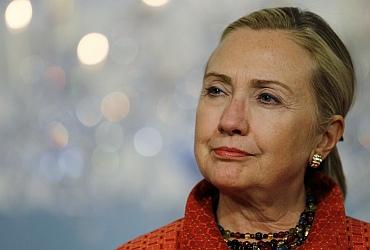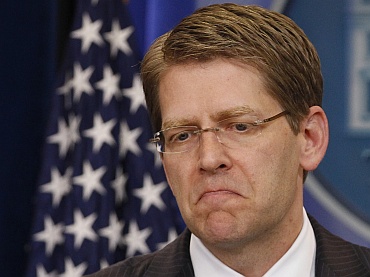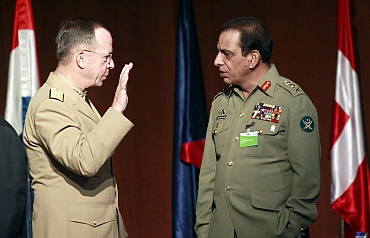
United States Secretary of State Hillary Clinton in major diplomatic mode, trying to save the US-Pakistan relationship; White House adopts same tack; meanwhile, the pro-Pakistan lobby is on an overdrive. Aziz Haniffa reports.
Obviously concerned over the unravelling United States-Pakistan relationship and the angry bluster from Islamabad, Secretary of State Hillary Clinton got into major diplomatic mode with the White House taking a similar cue to mollify the Pakistan that they were still an indispensable ally and imperative for the war on terror.
During two separate press stake-outs after her meetings with the Nigerian and Egyptian foreign ministers respectively, Clinton was attempting damage control when questions were thrown up about whether the US-Pakistan relationship, and even when pressed, refused to endorse the no-holds-barred statements by Admiral Mike Mullen, who continued to stand by his remarks about the ISI perfidy.
When pressed on why the administration -- or parts of the administration, Clinton said, ""I would urge people to look at the entirety of Admiral Mullen's testimony."
"He did raise serious questions, which our government has raised with the Pakistanis about the continuing safe haven for terrorists that strike across the border in Afghanistan against Afghans, Americans, North Atlantic Treaty Organisation International Security Assistance Force troops, civilians working there, as well as within Pakistan," she said.
"Admiral Mullen also said that this is a very critical consequential relationship," she added.
"We have a lot of common interests, most particularly the fight against terrorism. So we are making clear that we want to see an end to safe havens and any kind of support for terrorists inside Pakistan, and we also want to continue to work to put our relationship on a stronger footing," she said.
She said, "As you may know, I had a very long meeting with Pakistan's Foreign Minister, Hina Rabbani Khar, a week ago Sunday and we discussed the urgency in the wake of the attack on our Embassy in Kabul and on the NATO-ISAF Headquarters for us to confront the threat posed by the Haqqani Network."
...

Clinton, attempting to convey the notion that Pakistan is a victim too from the terror of the Haqqani Network said, "It was certainly a threat to the US, but it was also a threat to Pakistan, to Afghanistan, and to anyone who stands against terrorism."
"You will see a lot of work taking place as we try to determine how best to confront this mutual threat. And it's important to realise that while it's not always easy, the US and Pakistan have vital strategic interests that converge in the fight against terrorism," she added.
Clinton reiterated, "Pakistan faces a very real threat. They have suffered far more casualties, civilians and military alike. It is their mosques and markets and police stations and homes that have been bombed and attacked."
"So we are committed to working with Pakistan to confront this threat, and we have had a lot of tangible results from our cooperation. I mean, most recently the Pakistanis helped to roll up al Qaeda's number two," she said.
She added, "They have been helping us continue to dismantle the al Qaeda network that is inside Pakistan. So I have no argument with anyone who says this is a very difficult and complex relationship, because it is. But I also believe strongly that we have to work together despite those difficulties."
Asked if the State Department was close to designating the Haqqani Network a Foreign Terrorist Organisation and why it hasn't been already so named, Clinton said, "With respect to the Haqqani Network, we are in the final formal review that has to be undertaken to make a government-wide decision to designate the network as a Foreign Terrorist Organisation."
"But remember, we've already designated the key leaders. I did that some time ago to make it clear that the leaders of this organisation fell under the Foreign Terrorist designation. So we're going to continue to struggle against terrorism, and in particular against those who have taken up safe havens inside Pakistan," she said.
...

Over at the White House spokesman Jay Carney adopted a similar line in attempting to cool the temperature, saying, "The relationship that we have with Pakistan is complicated but very important."
"There's no question that we have disagreements, complications in our relationship, and we speak openly and candidly with our Pakistani about this," he added.
When asked what discussions are going on right now with the Pakistanis about military action that might go beyond drones, Carney said, "Certainly, we take action against the enemies of the United States -- members of al Qaeda -- where we find them. And as you know, in the case of Osama bin Laden, that happened to be in Pakistan."
Carney said, "The fact of the matter is we are fighting a war in Afghanistan, and one of the problems we've had, which is where this issue arises from, is with the safe havens that the Haqqani network has in Pakistan."
Meanwhile, the pro-Pakistan lobby in the US, comprising the powerful network of the affluent and influential Pakistani American physician community and businessmen were quickly getting on overdrive and hosting a major fund-raiser for Congresswoman Ileana Ros-Lehtinen, Florida Republican who is the chairman of the House Foreign Affairs Committee, in New York.
Ros-Lehtinan can be a major player when it comes to either cutting off or retaining the massive American aid largesse provided to Pakistan and hence the Pakistani American community's efforts to move quickly to host fund-raisers for key players like her.
Simultaneously, another influential player in the Pakistani American community, Taya A Gaya, Executive Director of the Pakistani American Leadership Center, which is active on Capitol Hill took some hefty swipes at Mullen, even as he exhorted people to read all of Mullen's testimony to the Senate Armed Services Committee, where his comment about the Haqqani Network being a "veritable arm of Pakistan's ISI" set off a hornet's nest.
...

Gaya said, "With Admiral Mullen's retirement this week, the professional relationship with General Kayani he cultivated in over 28 visits to Islamabad transfers to the new chairman, but a personal relationship cannot be transferred, it is unique to the individual."
"Knowing this, Mullen, much to Kayani's chagrin, chose this moment to "cash out" on the personal goodwill their friendship had generated by going public with the harshest accusations ever levelled against the Pakistani military and ISI regarding their alleged support for the Haqqani network," he wrote in an op-ed in PALC's website.
But in "All the furor that Admiral Mullen's comments generated, it is easy for two points to get lost," Gaya said.
"First, it ultimately failed to produce any new Pakistani military action against the Haqqani network as confirmed by the outcome of the Pakistani corps commander meeting, and second, the most important takeaway from Mullen's Senate testimony was not the heightened level of accusations against Pakistan but his assessment that 'a failed and strained engagement with Pakistan is better than disengagement'," he said.
Gaya warned that if US assistance to Pakistan is cut, it would not only "have negative ramifications on international lending to Pakistan and likely further collapse the economy and increase unemployment," it would also "ratchet up our (American) accusatory rhetoric and demonstrate our seriousness by launching raids into the FATA and Baluchistan, risking military engagement with Pakistan and forcing the democratically-elected government to close ranks behind the military."
It would also, he said, bolster "anti-American and extremist elements within the country thereby dramatically increasing the threat to American national security and putting our troops in Afghanistan at risk by exposing them to an almost-certain cutoff in their supply lines."
Gaya said, ultimately if the Haqqani Network is designated a Foreign Terrorist Organization, "thereby implicating Pakistan as a state-sponsor of terrorism," it would isolate "Pakistan from others in the international community while precipitating another crisis between the US and the international Muslim community."
Thus he argued, "Given this alternative, a strategy of engagement -- one that at its core also meaningfully engages Pakistan on Afghanistan and addresses Pakistani fears of Indian encirclement -- is not only more prudent, it is in fact, less costly. We just have to be smart enough to see that, and patient enough to see it through."